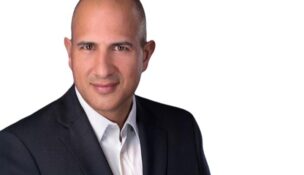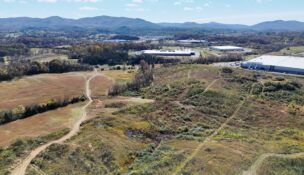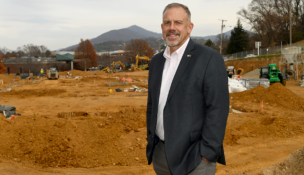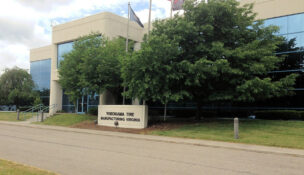Mining company partners with Virginia Tech on rare earths plant
Aclara Resources plans to invest $10M on Blacksburg facility
Beth JoJack //August 20, 2025//

Aaron Noble, Virginia Tech professor and department head, (left) and Francisco Haussmann, project superintendent for Aclara Resources, in a Virginia Tech lab Aug. 14, 2025. Photo by Natalee Waters

Aaron Noble, Virginia Tech professor and department head, (left) and Francisco Haussmann, project superintendent for Aclara Resources, in a Virginia Tech lab Aug. 14, 2025. Photo by Natalee Waters
Mining company partners with Virginia Tech on rare earths plant
Aclara Resources plans to invest $10M on Blacksburg facility
Beth JoJack //August 20, 2025//
SUMMARY:
- Aclara Resources plans to invest $10 million on rare earths separation pilot plant at Virginia Tech
- U.S. government considers establishing rare earth supply chain a matter of national security
- Aclara Resources is seeking location for full-scale separating facility
Canadian mining company Aclara Resources plans to invest about $10 million to establish a rare-earth elements separation pilot plant at the Virginia Tech Corporate Research Center, according to the company’s chief operating officer.
Rare earths are a group of 17 elements used to manufacture a wide range of high-tech products, including smartphones, electric vehicles and semiconductors, and China has a monopoly on many of the elements and their processing.
The company plans to hire seven new workers for the pilot plant in Blacksburg. They will process rare earth feedstock from an Aclara mine in Brazil with solvent extraction technology to separate out high-purity light and heavy rare earth elements.
Aclara COO Hugh Broadhurst said he expects the facility to be up and running quickly: “Starting from September through Q4 this year, we’re going to be ramping up our operations there.”
The project will be conducted in cooperation with Virginia Tech.
Aclara Technologies, the company’s U.S.-based subsidiary, recently signed a nonbinding memorandum of understanding with the university, which, according to the parties, “lays the groundwork for a long-term academic and scientific alliance that includes Aclara’s rare earths separation pilot plant.”
“We’re going to be hiring Virginia Tech staff and students to supplement our own staff,” Broadhurst said, adding that students will also be able to do research at the facility.
Aclara first contacted Virginia Tech about a partnership earlier this year, according to Aaron Noble, head of the department of mining and minerals engineering in Virginia Tech’s College of Engineering.
In the past decade, Virginia Tech faculty members have led more than 64 federally sponsored rare earths projects totaling over $32 million in research funding. Additionally, Virginia Tech faculty have filed 11 invention disclosures related to rare earths and critical minerals since 2021.
A partnership allows Aclara to layer Virginia Tech’s “extensive experience in rare earths” with the company’s operational know-how, according to a statement from Francisco Haussmann, a project superintendent for Aclara.
National security matter
China has a large stock of rare earth reserves and processes 90% of rare earths. Rare earth deposits can be found in other parts of the globe, but the United States has only one active rare earths mine, the Mountain Pass mine in California.
A July article in Econofact, an economic policy publication from Tufts University, summed up why that should matter to Americans: “The U.S. has almost no domestic capacity to process and refine rare earths into end-use components. … Dependence on China for these key components remains a vulnerability in the manufacturing supply chains for many military and high-technology products.”
“It’s something that various funding and federal agencies have been looking at for the last decade and trying to build both technology and human capacity for that, but we’re kind of getting to the point where [we’ve] got to do something now,” Noble said.
The urgency partially stems from China’s April announcement that it would impose export restrictions on seven rare earths as retaliation for tariffs imposed by President Donald Trump. In June, China announced a deal that would loosen rare earths exports to the United States.
The two countries have paused tariff increases through Nov. 10, while U.S. and Chinese leaders negotiate a deal, but even without the trade war, experts view domestic processing of rare earths as an important goal to reduce supply chain dependency on China.
Establishing the pilot rare earths separation plant in Blacksburg, Broadhurst said, is a step toward addressing “a critical vulnerability for the United States and other countries.”
Building facilities needed to process rare earths is one thing; the United States also needs to bolster its workforce. The nation’s mining industry as a whole faces a labor shortage.
Virginia Tech is one of only 14 mining engineering programs in the United States. Last year, the university’s Department of Mining and Minerals Engineering graduated fewer than 30 students, according to Noble. A department job fair held in Blacksburg each year typically attracts representatives from about 50 companies.
The talent situation is even more grim when it comes to rare earths.
“Right now, China has all the capability, all the expertise, all the talent,” Noble said. “We’re trying to rebuild that outside of China, and that’s part of what this partnership is about.”
Students who work at Aclara’s pilot plant could find themselves working for the company after graduation.
Aclara is currently seeking a U.S. site — probably in the Southeast, according to Broadhurst — to construct a full-scale rare earths separation plant by early 2029. The company, he says, has not yet determined how long the pilot plant will remain operational or if it will continue to run after the full-scale plant is running.
“Our customers are located in the U.S.,” Broadhurst said, “so it really makes sense for us to root ourselves in the United States so that we can provide product to them reliably and sustainably.”
e

















